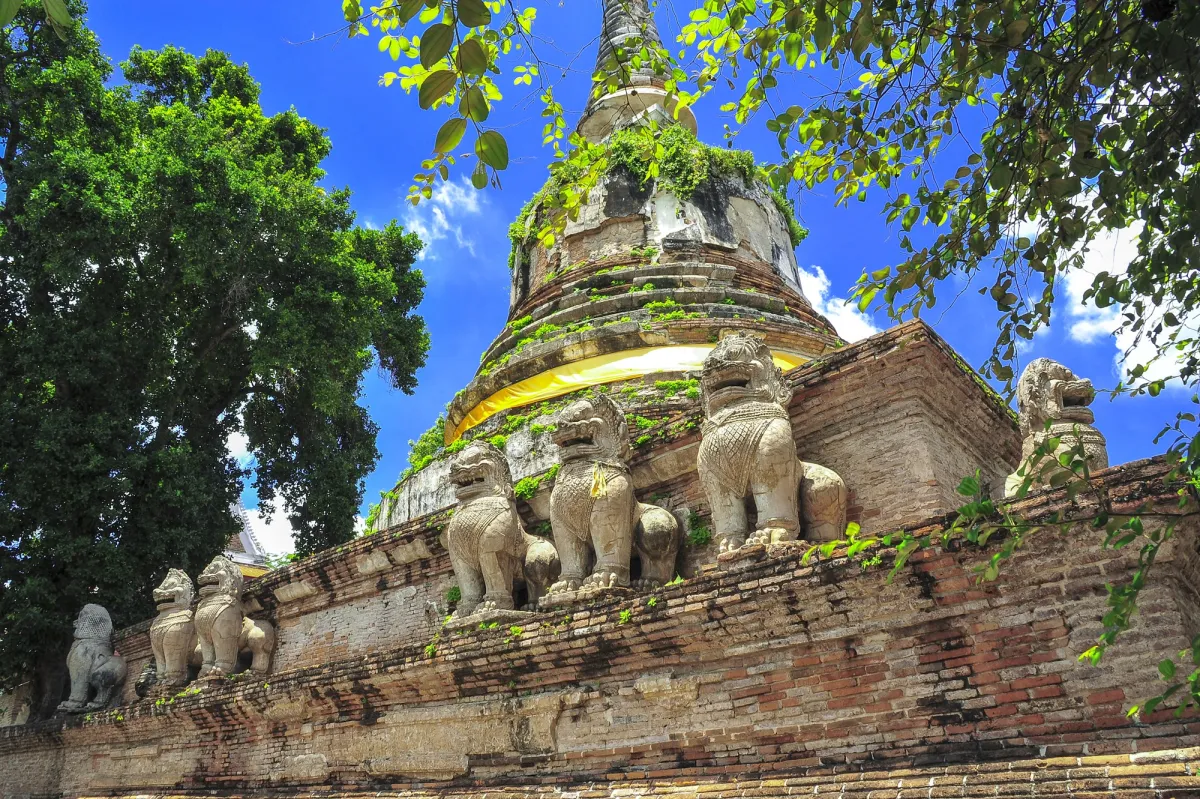
One of the not-to-be-missed temples for anyone visiting Ayutthaya is Wat Maenangpluem. The temple has been marked as a must-visit by "Lisa of BLACKPINK", making it an obligatory stop for those following her path. Located along the city canal (Khlong Mueng), opposite the Hua Ror market, Wat Maenangpluem is an ancient temple built during the Ayutthaya era. Originally known as Wat Tha Klong, named after the spot where elephants would pass before entering the fort, it was one of the locations where the Burmese set up their camp to fire their large cannons into Ayutthaya. As a result, this area was not destroyed and still possesses ancient Thai architecture, remaining well-preserved and beautiful to this day.
In addition to its historical significance, Wat Maenangpluem is also wrapped in legend. There are various beliefs regarding its origin: some say the temple predates the establishment of Ayutthaya, while others believe it was built during the reign of King Naresuan the Great. According to one legend, the land on which the temple now stands once belonged to Mae Pluem. She lived alone, without children or grandchildren. One day, King Naresuan, while sailing alone, encountered a violent rainstorm. Seeing a light from Mae Pluem's house, he sought refuge there, requesting refreshments and accommodation for the night. Even though Mae Pluem was not aware of the identity of her guest, she welcomed him graciously and spoke of the king with utmost reverence. Touched by her kindness, King Naresuan returned to the royal palace the following morning and soon sent a convoy to bring Mae Pluem to the palace to be cared for. To honor her kindness and compassionate heart, after Mae Pluem's death, King Naresuan arranged a grand funeral ceremony and built a royal temple in her name: Wat Maenangpluem, prior to the fall of Ayutthaya.
The notable highlights within Wat Maenangpluem include Luang Por Khao (the White Buddha), officially known as Phra Puttha Nimitr Mongkol Srirattanatrai. It is enshrined in an ancient chapel as the principal white-purified Buddha image in the Mara Vichai position. Only the Buddha's head is painted black. The statue, made from shell lime, represents the early Ayutthaya art period. Today, it is widely believed that Luang Por Khao of Wat Maenangpluem holds powerful blessings. Any wishes made to this Buddha are thought to be granted, and worshippers must make a return visit once their wishes are fulfilled.
The Singlom Pagoda, the main bell-shaped pagoda, is situated on a large square base and surrounded by 36 lion statues. It is embellished with a lotus adorned with calabash flowers, a design inherited from Khmer-Lopburi art. However, the lotus base is relatively high. It is assumed that this Singlom Pagoda was influenced by the Elephant-surrounded Pagoda in Sukhothai art, which in turn was influenced by Khmer art at that time. This is due to the facial expression and posture of the lions at Wat Maenangpluem, which are comparable to the Khmer lions. The main pagoda is a bell-shaped one from the early period, which has characteristics related to the bell-shaped pagoda in Sukhothai art and is nearly the same age as the main pagoda at Wat Mahaeyong.
The temple gate is an ancient style entrance that gives a sense of stepping back in time to the ancient city of Ayutthaya. This gate, through which Luang Por Khao can be seen perfectly, was originally used solely for the passage of the king. Ordinary citizens and nobles were not allowed to pass through it.
The chapel of Wat Maenangpluem is a square building with a gable decorated with a bowl design. It is adorned with intricate stucco patterns. Inside, Luang Por Pluem, or Phra Puttha Mahapiti Theva Nrumit Pattimakorn, the principal Buddha image of the chapel, is enshrined. It is a Buddha image in the Mara Vichai posture, covered in gold.
Wat Maenangpluem is open for visits every day from 08:00 to 17:00. Entry is free for both Thais and foreigners. For further details, you can contact the Ayutthaya Provincial Administration Organization at +66 3579 6447.